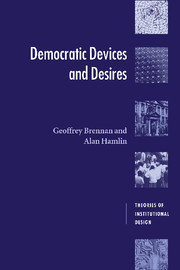Book contents
- Frontmatter
- Contents
- List of figures
- Preface and acknowledgements
- 1 Introduction
- Part 1 Democratic desires
- 2 On human nature: beyond homo economicus
- 3 Moral dispositions
- 4 Economising on virtue
- 5 Political mechanisms
- 6 Mechanisms and dispositional choice
- 7 Problems of democratic politics
- Part II Democratic devices
- Bibliography
- Index
3 - Moral dispositions
Published online by Cambridge University Press: 22 September 2009
- Frontmatter
- Contents
- List of figures
- Preface and acknowledgements
- 1 Introduction
- Part 1 Democratic desires
- 2 On human nature: beyond homo economicus
- 3 Moral dispositions
- 4 Economising on virtue
- 5 Political mechanisms
- 6 Mechanisms and dispositional choice
- 7 Problems of democratic politics
- Part II Democratic devices
- Bibliography
- Index
Summary
It may be a reflection on human nature, that such devices should be necessary to control the abuses of government. But what is government itself, but the greatest of all reflections on human nature? If men were angels, no government would be necessary. If angels were to govern men, neither external nor internal controls on government would be necessary.
(Federalist papers, 51, James Madison)Rationality and trust
We have, in the foregoing chapter, suggested one reason why moral motivations might play a disproportionately significant role in democratic politics: the mechanics of democratic elections may engage expressive rather than instrumental concerns, and the expressive calculus is more likely to promote moral action. In short, the veil of insignificance reduces the price of moral action in the political arena relative to the market arena, so that we would expect more moral action in politics. We now want to turn to a different line of argument, which has the same general ambition – namely to suggest that moral motivations may be especially relevant in the setting of democratic politics. This line of argument stems from the idea that rationality might require departures from egoism: that homo economicus is self-defeating in a range of circumstances of relevance – and self-defeating in a way that is hospitable to certain accounts of morality. We will present our argument in three steps.
- Type
- Chapter
- Information
- Democratic Devices and Desires , pp. 34 - 50Publisher: Cambridge University PressPrint publication year: 2000



